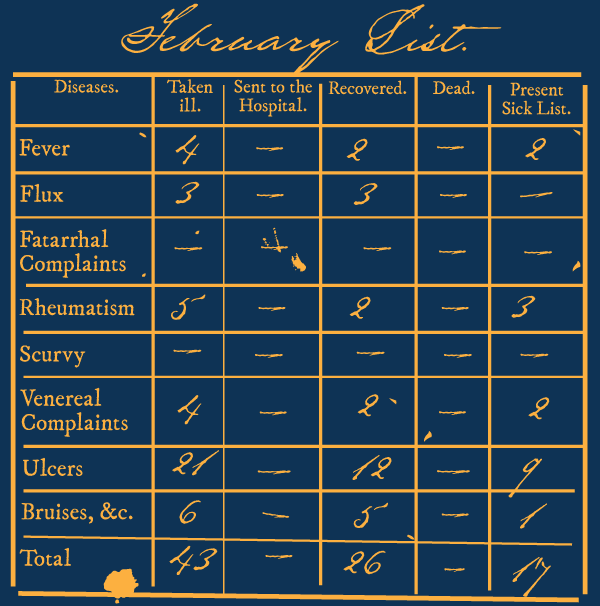This letter has been translated from it’s original French.
 |
| Dr. Ducett Loremir |
Dear Brother,
In writing to you I
often feel I must begin afresh from the start, never knowing which letters you
may have received.
This time I shall begin by saying I am now in a happier
situation than I have found myself in these last several years. I hope that you
have received my past letters and know that I have been transferred from the
prison hulk to the frigate Acosta, a fifth rate of forty guns, Sir James Rehme,
Captain. We are on the North American Station, which is where you should write
to me.
I have written to you past of my assistant surgeon Mr.
Girard, a creole of about my own age. While a capable assistant surgeon, he had
manifested a dislike for me on the basis of his loyalty to the Acosta’s former
surgeon, a Dr. Roberts. Dr. Roberts
apparently had an interest equal to my own in the Natural Sciences and left
behind a goodly collection of specimens upon his departure. Mr. Girard had
taken upon himself a curatorial guardianship of these specimens. On first
discovering these specimens I examined them myself with great interest, an
event Girard viewed with obvious distaste. The second time I went to do so I
found they had been moved and upon enquiring, found that they had been “stowed more securely” until Dr Robert’s
return, an event which he looked upon with the same reverence and hope which a
good Anglican places upon Christ’s second coming. There was even a particular
chair, the former good Dr.’s, upon which I was not allowed to set on the charge
of its being unsound until the carpenter could make it so. How the man was named
assistant surgeon I know not, as he obviously has no formal schooling for such
an endeavor, although he can read both French and English well enough. I should
have thought that with our shared heritage and interest in the Natural Sciences
and we should have worked well together, but such was not the case. His
deportment toward me was always overly formal and strained.
The other assistant surgeon was Mr. Reed, English of course,
who did have a formal medical education, but who was without imagination or
enthusiasm for his assignment. He was capable enough but went about his duties
with the same curiosity and investigative spirit a sailor shows for holystoning
the deck.
 |
| Mr. Andrew Richardson |
Most recently Reed was invalided ashore, and I was sent a
temporary replacement, Mr. Richardson, and this young man has made all the
difference! He is apparently from a good family settled upon one of the English
islands in the West Indies or Caribbean and has had a formal medical training.
Additionally, he shows a great aptitude as an apothecary, making tinctures,
teas, salves and such from herbs and minerals. Being from the Americans he is
familiar with the identification of most local plants and knowledgeable about
their restorative and healing properties.
Should this horrid war finally come to a close I should expect to see
him move beyond the status of a mere surgeon and become a physician of renown.
 |
| The Mole Cricket |
Shortly after he came aboard I found him with Girard in
study of some specimen with their hand lenses. So intent were they that were
completely unaware of my approach. The specimen was a most curious insect which
Richardson called a Mole Cricket. The name was apt, for its front feet were
almost identical in form to that most singular mammal! I shall send you a
sketch in the future. I assumed this was one of Dr. Roberts specimens but was
gratified to learn that it belonged to Richardson! He has brought with him a
specimen collection of his own! Girard’s curiosity was aroused to such a degree
that he forgot himself and retrieved some of Dr. Roberts sacred specimens for
comparison! Our discussion was so interesting and involved I retrieved some of
my own specimens for this impromptu lecture. As I was expanding on the mystery
of a turtle’s breathing- for they have lungs and not gills, yet their rib cage
composes the shell, which is immobile. How do they draw breath? In any case at
this juncture we noticed one of Girard’s young sons who had been standing there
I know not how long, he has two which are ship’s boys on the Acosta, who piped
in with “Lieutenant McClain’s complements and he wishes Dr. Loremir to know
that the sick have been waiting at the mast for some time now”. We had all been
so engrossed that we had completely lost the time!
It seems that in addition to an exceptional assistant
surgeon and apothecary, Mr. Richardson is an avid student of the Natural
Sciences with a particular interest in creatures of the marine realm. Since
this happy juncture any time he or Girard go ashore with a wood or watering
detail they return with some specimen and usually with some useful herbs. It
seems Girard also has some knowledge of simples and their preparations. When
the two are allowed ashore together the rewards are even greater. Such
discoveries and investigations we shall make!
The restraining cord has even been removed from Dr Roberts throne and I
have been allowed the honor of being so seated!
While I wish Reed no ill will, especially not a long
illness, I shall endeavor to keep Mr. Richardson with this command with every
means in my power!
So Dear Brother wish me the joy of my new situation. I send
all my love to you and your family. Write to me at every chance.
Your loving brother,
Ducett





































